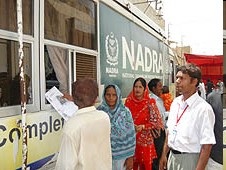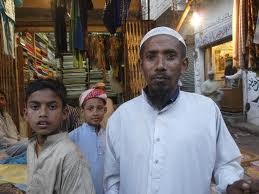Memo #100
By Nausheen Anwar – nhanwar [at] iba.edu.pk
 The rise of the “security state” is not just a Western phenomenon. Post 9/11 Pakistan has seen a proliferation of new surveillance technologies that created social divisions and marginalized long-term migrants previously welcomed in the name of Islamic solidarity.
The rise of the “security state” is not just a Western phenomenon. Post 9/11 Pakistan has seen a proliferation of new surveillance technologies that created social divisions and marginalized long-term migrants previously welcomed in the name of Islamic solidarity.
Across South Asia and especially in Pakistan, surveillance technologies such as biometrics and amendments to the Foreigners Act have aligned concerns about national security with matters of immigration and citizenship.
These realignments have thrown into sharp relief the status of nearly 2.5 million Burmese-Rohingya and Bangladeshi refugees and migrants, respectively, who came to Pakistan in the 1960s from Myanmar to escape religious persecution and in the 1980s from Dhaka, Bangladesh in search of jobs. The heightened requirements for Pakistani citizenship exclude such migrants, making them vulnerable to detention and deportation. Even those who have lived in Pakistan for over 40 years may now be unable to access welfare schemes or seek medical care.
The Pakistani government is using new technology including the biometric national identity card (CNIC), which locates individual membership in the national community. Crucial for obtaining a Pakistani passport or a work permit, these cards are issued by state agencies (National Alien Registration Authority and National Database and Registration Authority) under the powerful Ministry of Interior. Notably, it is in Pakistan, rather than in India, that the biometric identification system has been widely deployed to control immigration and facilitate entitlements.
The regulation of illegal migrants is the cornerstone of a strategy that sees the alien population as undermining the state’s capacity to maintain law and order and national unity. For the Burmese-Rohingya, the CNIC provides certain entitlements such as a work permit but not a Pakistani passport, which carries the right to vote. Their labour is an object of law but their ineligibility for citizenship makes them a disposable commodity.
Recent research reveals that counterfeit documents are one way of obtaining political status in Pakistan. Another is through powerful regional political parties such as the Muttahida Qaumi Movement (MQM), which channel migrant claims.
The MQM uses democratic rhetoric – ‘right to vote’ – and its sophisticated machinery of workers at the local level to secure votes from migrants who do not possess identity cards. Patronage systems facilitate dispute settlement and provision of dowries, but are a poor substitute for full political privileges that new security concerns make almost impossible.
About the Author:
Nausheen Anwar – Assistant Professor of Urban Studies, Department of Social Sciences, Institute of Business Administration (IBA), Karachi, Pakistan.
Links:
- International Migrants and the City, Book by Marcello Balbo, January 2005.
- NADRA Shows Pakistan’s Edge in IT Services, South Asia Investor Review, May 2011.
- The Case for More Fences, Asia Times, February 2003.
- In Search of an Identity, Newsline, May 2010.
- Paper Citizens: How Illegal Immigrants Acquire Citizenship in Developing Countries, International Studies, October 2009.
- Bengalis Action Committee to back MQM in polls, Daily Times, November 2007.
- Scanning 2.4 Billion Eyes, India Tries to Connect Poor to Growth, New York Times, September 2011. (A recent report on how such technologies are linked to welfare eligibility in India).
Related Memos:
- Our other Memos on religion, Islam, migrants, labour, and Political Science.

